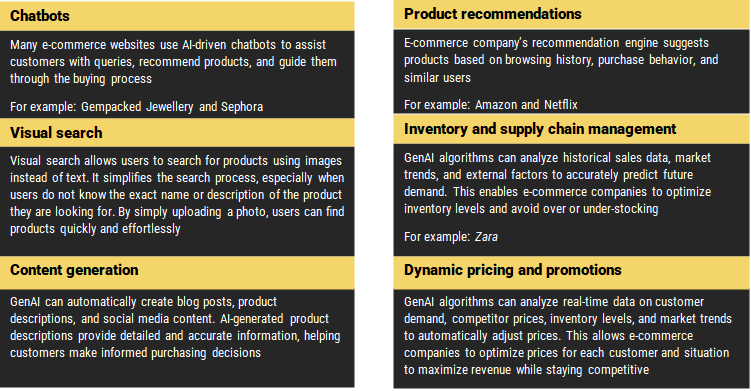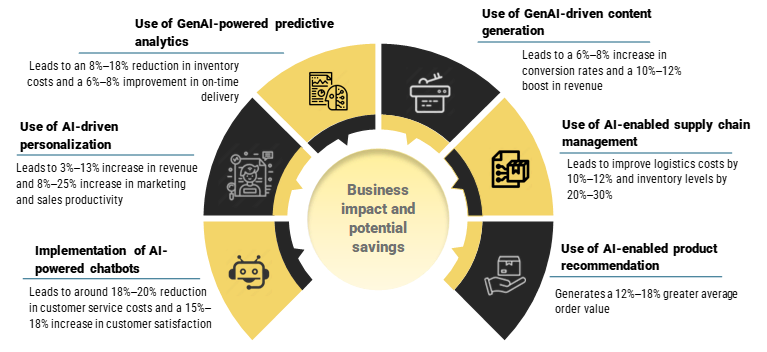Introduction to GenAI in E-commerce
Generative Artificial Intelligence (GenAI) is rapidly redefining how e-commerce businesses operate and connect with consumers. GenAI is revolutionizing e-commerce by delivering highly personalized experiences, automating key processes, optimizing operations, and providing data-driven intelligence, ultimately driving growth, efficiency, and customer satisfaction for online retailers.
GenAI technologies used in e-commerce
In the e-commerce context, GenAI technologies are being leveraged in various ways, including:

Potential use cases of GenAI in e-commerce
Customer service: AI chatbots and virtual assistants
AI-powered chatbots and virtual assistants have become indispensable in e-commerce, providing efficient and personalized customer support. Leveraging natural language processing and ML, these intelligent systems understand customer queries, access relevant information, and deliver accurate, timely responses 24/7.
The benefits of AI chatbots and visual assistants in e-commerce include:

By harnessing the power of AI, e-commerce businesses can provide superior customer support, improve operational efficiency, and gain data-driven insights to stay competitive in the evolving digital landscape.
Case study: Gempacked Jewellery ‘s success using chatbots and e-commerce marketing automation:
| Background: Gempacked Jewellery, an online jewelry retailer in Los Angeles, US, aimed to enhance its customer experience and streamline operations. With a growing customer base, they faced challenges in providing timely and personalized support while optimizing marketing efforts to boost sales and engagement |
| Solution: To address these challenges, Gempacked partnered with India-based Smarter Codes to implement AI-powered chatbots and advanced e-commerce marketing automation tools. The chatbot, named “GemBot,” was integrated into their website and mobile app, while the marketing automation tools enhanced customer engagement and retention strategies. |
| Results: Faster response times and accurate assistance from GemBot increased customer satisfaction scores by 25% Personalized product recommendations and targeted marketing campaigns boosted sales by 20% Automated email campaigns and personalized offers led to a 30% increase in customer engagement. |
Personalized shopping experiences: Recommendation engines
GenAI-powered recommendation engines are revolutionizing e-commerce by delivering highly personalized shopping experiences that drive customer engagement, loyalty, and sales. At the core of these systems are sophisticated predictive analytics and machine learning algorithms that analyze customer data, browsing history, and purchase patterns to identify personalized product suggestions, cross-sell opportunities, and tailored content. By providing customers with relevant and compelling product recommendations, these GenAI-powered engines encourage further exploration, discovery, and increased average order value.
Case study: Amazon’s success using recommended engines:
| Background: Amazon, the world’s largest online retailer, serves millions of customers across the globe. A significant part of its business strategy revolves around providing a highly personalized shopping experience. For this, Amazon wanted to utilize advanced ML algorithms to suggest products to customers based on their past behavior and preferences. |
| Solution: To address this challenge, the company employs sophisticated ML techniques like collaborative filtering, content-based filtering, and hybrid models to analyze vast amounts of customer data collected from interactions, browsing history, and purchase patterns. The company employs sophisticated ML techniques like collaborative filtering, content-based filtering, and hybrid models to analyze this data and provide relevant product recommendations. Amazon’s recommendation engine delivers real-time, personalized suggestions that adapt to users’ current interests, browsing context, and seasonal trends, including dynamic website recommendations and personalized emails. |
| Results: By harnessing data and AI, Amazon offers highly relevant product recommendations that drive customer engagement, loyalty, and sales Personalized recommendations contribute to an estimated 35% of Amazon’s total revenue Continuous interaction through personalized emails and recommendations helps Amazon maintain long-term relationships with its customers |
Inventory and supply chain management: Predictive analytics and demand forecasting
GenAI algorithms can analyze vast amounts of data, including historical sales, market trends, and external factors, to accurately predict future demand and optimize inventory management. This enables e-commerce businesses to avoid stockouts, reduce excess inventory, and streamline their supply chain operations, leading to cost savings and improved customer satisfaction.

Inventory optimization balances inventory levels to ensure adequate stock without overburdening storage Supply chain synchronization aligns supply chain activities with predicted demand to ensure timely restocking and reduced lead times. By leveraging predictive analytics and ML algorithms, e-commerce businesses can generate accurate demand forecasts, optimize inventory levels, and synchronize their supply chains – leading to improved efficiency, reduced costs, and enhanced customer experience.
Case study: Zara’s success using advanced AI-powered demand forecasting system:
| Background: Zara, the popular fast-fashion retailer, wanted to implement an advanced AI-powered demand forecasting system that would help drive its success in the highly competitive fashion industry. By harnessing the power of artificial intelligence, Zara wants to analyze real-time data from its extensive network of physical stores and online channels to predict sales and optimize inventory levels with accuracy. |
| Solution: To address this challenge, the company collects and processes massive amounts of data from various sources, including point-of-sale data from its 2,000+ stores, online sales and browsing data, social media trends, competitor pricing, and weather patterns. Sophisticated machine learning algorithms analyze this data to identify patterns and relationships that can forecast demand at the individual store and SKU level. The system considers factors like historical sales trends, product popularity, and localized preferences. Zara’s AI models continuously learn from new data, refining their predictions over time. This allows the company to rapidly adjust inventory and production plans to align with forecasted demand. |
| Results: By harnessing the power of AI and leveraging data from across its operations, Zara is able to generate highly accurate demand forecasts that enable the company to meet customer demand efficiently and stay ahead of trends in the fast-paced fashion industry. |
Marketing and sales: Automated content creation and dynamic pricing

The combination of automated content creation and dynamic pricing powered by GenAI represents a transformative opportunity for e-commerce companies to enhance their marketing and sales capabilities. By leveraging these AI-driven capabilities, online retailers can deliver more personalized, engaging experiences while optimizing their pricing and revenue strategies.
Potential use cases of GenAI in e-commerce and their adoption rate
| Use case | Description |
| AI chatbots and virtual assistants | Widely adopted for customer service and initial product inquiries |
| Personalized product recommendations | Commonly used to enhance customer engagement and drive sales |
| Automated content generation | Increasing adoption for product descriptions and marketing copy |
| Dynamic pricing | Gaining traction for optimizing pricing strategies based on demand and competition |
| AI-powered visual search | Allows customers to search for products using images, enhancing the shopping experience |
| Virtual try-on | Enables customers to virtually try on clothes or makeup before purchasing, improving confidence and reducing returns |
Business impact and potential savings of using GenAI in e-commerce
GenAI offers e-commerce businesses the potential to increase revenue through personalized recommendations, improved customer service, and optimized pricing; reduce costs by automating repetitive tasks like content creation and customer support; and enhance efficiency by streamlining operations and improving decision-making through data-driven insights.
The adoption of GenAI in e-commerce has demonstrated significant business impact and potential savings for companies across various verticals.

Challenges and considerations
While the potential benefits of GenAI in e-commerce are substantial, there are also a number of challenges and considerations that businesses must address.

Future trends and conclusion
As the e-commerce landscape continues to evolve, GenAI’s role is poised to become even more prominent. Emerging trends in the field include:

The integration of GenAI in e-commerce has the potential to transform the industry, driving unprecedented levels of personalization, efficiency, and innovation. By harnessing the power of this transformative technology, e-commerce businesses can enhance customer experiences, optimize operations, and unlock new avenues for growth.
However, successful implementation requires addressing significant challenges, such as data privacy, ethical concerns, technical barriers, and the need for robust evaluation metrics. By proactively managing these issues, businesses can leverage GenAI to solidify their position in the highly competitive digital marketplace, ensuring long-term success and sustainability. As technology continues to advance, the businesses that adapt and innovate with GenAI will be best positioned to thrive in the future of e-commerce.


